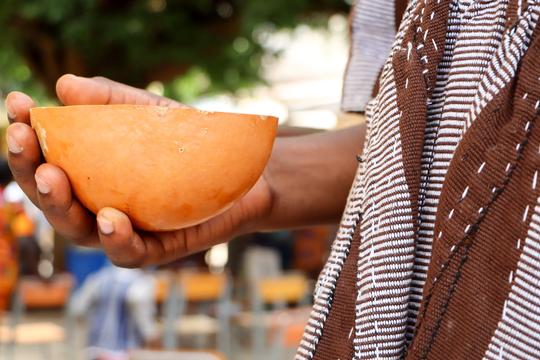
Not just jollof: 13 must-try Ghanaian foods
From renowned staples like fufu to regional specialities like tuo zaafi, here's how to get your hands on tasty Ghanaian eats
Nestled along West Africa’s coast and sandwiched between Togo, Côte d'Ivoire, and Burkina Faso — Ghana is a culture-packed destination where rich history, diverse cultures, and stunning landscapes come together in one lovely package. Dive into the country’s history with a visit to the Cape Coast Castle — a poignant site of the transatlantic slave trade — hike Ghana’s highest mountain, Afadajato, or explore the ancient traditions of the Ashanti Kingdom in Kumasi.
Visa requirements may change, so for the most up-to-date information we recommend using our Entry Requirements tool. Alternatively, check the Ghanaian embassy website in your country of departure.
Recommended vaccinations for Ghana include hepatitis A, tetanus, polio, and yellow fever. However, as advice often changes, you can check out our Entry Requirements tool for the most up-to-date details on vaccination requirements.
Ghana has a tropical climate characterized by distinct wet and dry seasons. The southern regions, including Accra, get rain from March to November peaking in April to June and September to October. Temperatures are fairly consistent throughout the year — expect highs of around 32°C (89.6°F) in February and March and lows of around 23°C (73.4°F) in July and August.
The best time to visit Ghana really depends on what you’re looking for, but generally, the ideal time is during the dry season running from November to March. Temperatures are high and the weather is sunny, and this is also when you can enjoy various festivals too. April to October is the wet season with plenty of rainfall, green landscapes, and fewer travellers.
Tipping is not mandatory in Ghana, but it’s appreciated for good service. 10 to 15% is a good ballpark figure for service staff, tour guides, and at restaurants.
Tipping your G Adventures CEO is also very much appreciated. The amount is entirely a personal preference but as a guideline USD$ 20-30 per person, per week is our recommendation in the region. However, if you felt your CEO did an especially outstanding job, any additional amount is always welcome.
Internet access and Wi-Fi in Ghana have improved significantly over the past decade, and it's widely available in urban areas like Accra. In rural areas, expect it to be a bit more unreliable.
Yes, you’ll find plenty of ATMs in Ghana, especially in major cities and towns. Most ATMs accept Visa and Mastercard cards, though you may be charged a transaction fee for this — check with your bank before you travel. If you’re heading out into rural areas like Mole National Park, it’s a good idea to carry cash with you in case you can’t locate an ATM.
In a word, no — Ghana is not an LGBTQ+-friendly country. Same-sex relations are illegal and punishable by imprisonment. Discretion is advised. G Adventures is committed to LGBTQ+ inclusion; find out more via our LGBTQ+ travel page.
Ghana is a multilingual country with over 80 languages spoken. The official language is English, while Twi, Ga, Ewe, and Dagbani are among the most widely spoken indigenous languages.
No — tap water in Ghana is not safe to drink without treatment. Stick to bottled water, which is cheap and widely available. Drinks provided on our tours and in hotels/restaurants are safe.
Ghana is generally safe for travellers, though petty crime can occur in cities like Accra and Takoradi. Road safety is also a concern. G Adventures takes safety seriously; find out more via our Travel Safety page.